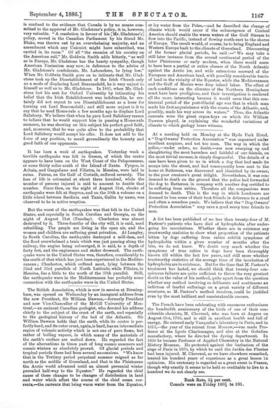The British Association, which is now in session at Birming-
barn, was opened on Wednesday by an inaugural address from the new President, Sir William Dawson,—formerly President and now Vice-Chancellor of the McGill University of Mon- treal,—an eminent Canadian geologist, who devoted his address -chiefly to the subject of the crust of the earth, and especially -to the geological history of the bed of the Atlantic. Sir William Dawson holds that the earth, while its centre is per- fectly hard, and its outer crust, again, is hard, has an intermediate region of volcanic activity which is not one of pure flame, but rather of boiling vapour, in which many of the materials of the earth's surface are melted down. He regarded the fact 'of the alternations in times past of long cosmic summers and cosmic winters as absolutely proved. Of glacial periods and tropical periods there had been several successions. "We know that in the Tertiary period perpetual summer reigned as far north as the middle of Greenland, and that in the Pleistocene the Arctic world advanced until an almost perennial winter prevailed half-way to the Equator." He regarded the chief cause of these changes to be changes of distribution in land and water which affect the course of the chief ocean car- rents,—the currents that bring warm water from the Equator,
or icy water from the Poles,—and he described the change of climate which would occur if the submergence of Central America should enable the warm waters of the Gulf Stream to flow into the Pacific, instead of flowing north-east to the shores of Europe. The result would, of course, be to bring England and Western Europe back to the climate of Greenland. Discoursing of the former glacial periods, he said :—" We may take a still later instance from the second continental period of the later Pleistocene or early modern, when there would seem to have been a partial or entire closure of the North Atlantic against the Arctic ice, and wide extensions seaward of the European and American land, with possibly considerable tracts of land in the vicinity of the Equator, while the Mediterranean and the Gulf of Mexico were deep inland lakes. The effect of such conditions on the climates of the Northern Hemisphere must have been prodigious, and their investigation is rendered all the more interesting because it would seem that this con- tinental period of the post-Glacial age was that in which man made his first acquaintance with the coasts of the Atlantic, and, possibly, made his way across its waters." Thus, the Atlantic currents were the great organ-keys on which Sir William Dawson played, in explaining the wonderful variations of climate to which geology bears witness.


































 Previous page
Previous page